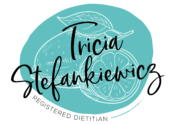By: Tricia
Today I want to spend some time talking about a topic I hear often in my nutrition practice. When I talk to my patients, we typically review the successes and challenges that the week presented to them. A statement that I hear very often is “I ate so good this week” OR “I ate a lot of bad food” this week. I want to spend some time shedding some light onto this concept of good food vs. bad food and why this is something I DON’T practice.
My concern is that this terminology of “good” vs. “bad” foods can lead to an unhealthy relationship with food, over restriction of food, and promotes diet culture mentality of thinness being the gold standard.
The problem with saying these things is that in saying “I ate good today” is that there is an underlying belief that because you “ate good today” you were somehow good today as a person. When you “ate bad today” somehow you were bad today as a person. Sounds absurd right, but here me out. It may not be a conscious belief that YOU are good or bad according to what food you ate. But by labeling these foods as good or bad, you may be validating an underlying belief about YOU personally being good or bad when you eat “good” or “bad” food. You may feel victorious for having self-control, willpower, and discipline and feel bad for what you think is lack of self-control, no will power, and weakness, guilt, and shame. Eating “good” may allow yourself to feel as if you deserve praise while eating “bad” may lead to feeling of guilt.
Another tricky notion about good vs. bad food mentality is that what defines “good” and “bad” food varies according to individual preference. For instance, for one person, “good” eating could mean: eating clean, following a paleo diet, eating organic or non-GMO food, cleanses, or low carbohydrate. For another person, “bad” could mean avoiding cleanses, keto diet, and high carbohydrate foods.
For other people, this could be labeled as bad or undesirable way of eating. In addition, each of these patterns may be too rigid and may mask disordered eating. These eating patterns promote black and white thinking that is present with disordered eating and a preoccupation with what you eat. Like the scale, eating “good” food and avoiding “bad” food does not determine your self-worth. Eating good may Instead it may continue the perfectionist cycle to achieve the “good” state you desire, which is all a farce and a completely unrealistic goal that you will never be truly able to achieve.
The good and bad food mentality may be fueled by a diet culture that worships thinness, demonizes eating patterns, and suppresses others who don’t meet these ideal criteria. Foods that are good and bad aren’t based on anything and change over time according to what diet culture tells us is acceptable at that time. In addition, good food is typically classified as foods that may make us thinner if we consume them while the bad food is often associated with what could make us gain weight if we eat them. Meaning, if we eat “good” food than we are good because we are skinny and if we eat bad food than we are bad because we are unhealthy, putting our health last, or do not fit the skinny criteria.
How do I start thinking about food differently? How can we ditch the good vs. bad food mentality?
• All foods have a place in our eating pattern, although some food SHOULD be eaten less than other foods. This is where the idea of moderation comes into play as all food may have a role in our body.
• ALL food provides nourishment or satisfaction that are body may be craving
• Eating “good” tells us nothing about how the food makes us FEEL or what it does to our body or our self -worth
• Eating a variety of food may help provide food freedom by allowing us to let go of shame and guilt
• Eating both “good” and “bad” allow us to be more in tune to our body’s cravings, demands, and feeling of hunger
• You are human, and part of that is eating foods in variety to provide nutrition while also providing pleasure. Eating all kinds of foods allows a balance to be established
• The way you eat says nothing about who you are as a person, that you are any better for eating “good” or any worse for eating “bad”
I don’t have this figured it out and I too sometimes find myself sometimes saying things like good or bad foods. That’s how pervasive diet culture is. Recognizing this pattern of thinking is a good place to start. This process of achieving whole health balance is not something that happens in a few days but rather over time while taking tiny, imperfect, consistent steps towards your health goal. Remember to start where you’re at. It’s not about being perfect, it’s about being 1% better each day.
Always seek the advice of your mental health professional or other qualified health provider if you require more emotional support with diet mentality.
